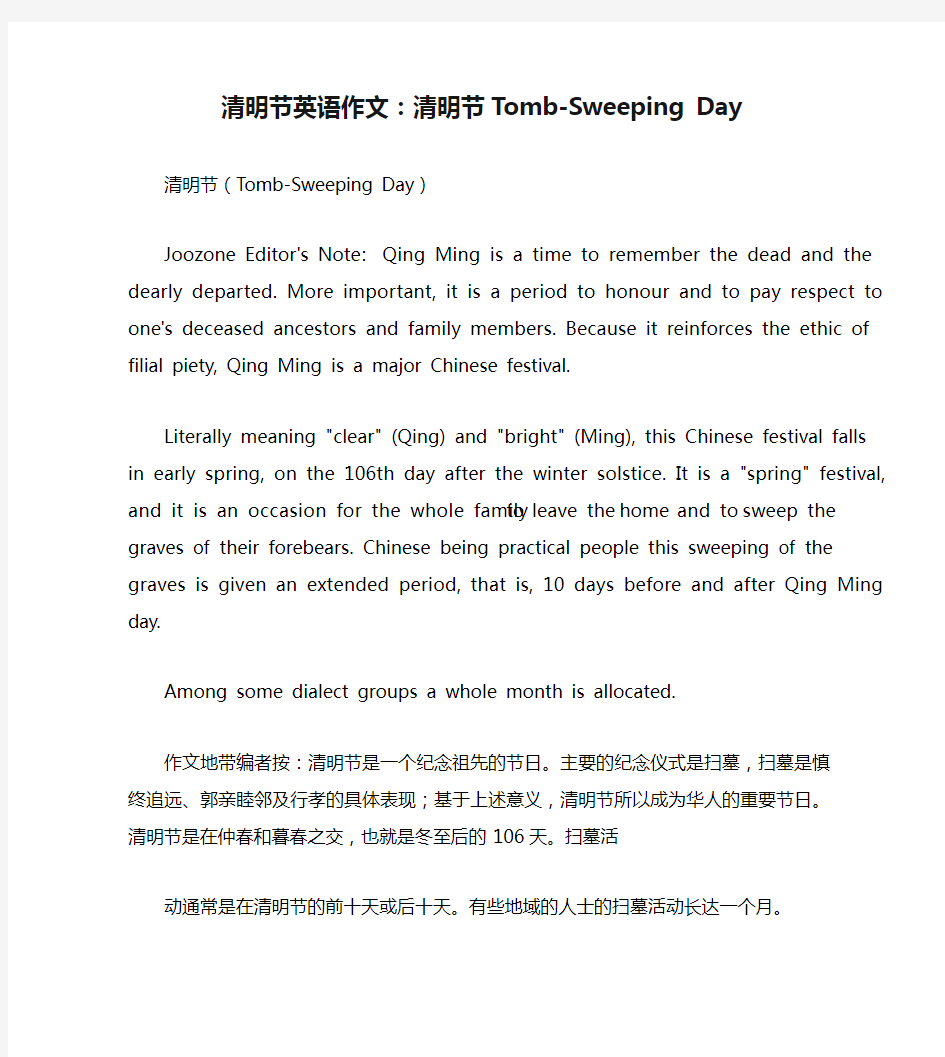
清明节英语作文:清明节Tomb-Sweeping Day
- 格式:docx
- 大小:38.52 KB
- 文档页数:3


清明节英语作文:清明节Tomb-Sweeping Day
清明节(Tomb-Sweeping Day)
Joozone Editor's Note: Qing Ming is a time to remember
the dead and the dearly departed. More important, it is a period to honour and to pay respect to one's deceased ancestors and family members. Because it reinforces the ethic of filial piety, Qing Ming is a major Chinese festival.
Literally meaning "clear" (Qing) and "bright" (Ming),
this Chinese festival falls in early spring, on the 106th day after the winter solstice. It is a "spring" festival, and it
is an occasion for the whole family to leave the home and to sweep the graves of their forebears. Chinese being practical people this sweeping of the graves is given an extended period, that is, 10 days before and after Qing Ming day.
Among some dialect groups a whole month is allocated.
作文地带编者按:清明节是一个纪念祖先的节日。主要的纪念仪
式是扫墓,扫墓是慎终追远、郭亲睦邻及行孝的具体表现;基于上述
意义,清明节所以成为华人的重要节日。清明节是在仲春和暮春之交,也就是冬至后的106天。扫墓活
动通常是在清明节的前十天或后十天。有些地域的人士的扫墓活
动长达一个月。
清明节起源ORIGIN(起源)
Qing Ming is popularly associated with Jie Zi Zhui, who lived in Shanxi province in 600 B.C. Legend has it that Jie saved his starving lord's life by serving a piece of his own leg. When the lord succeeded in becoming the ruler of a small
principality, he invited his faithful follower to join him. However, Jie declined his invitation, preferring to lead a hermit's life with his mother in the mountains.
Believing that he could force Jie out by burning the mountain, the lord ordered his men to set the forest on fire. To his consternation, Jie chose to remain where he was and was burnt to death. To commemorate Jie, the lord ordered all fires in every home to be put out on the anniversary of Jie's death. Thus began the "cold food feast", a day when no food could be cooked since no fire could be lit.
The "cold food" festival occurs on the eve of Qing Ming and is often considered as part of the Qing Ming festival. As time passes, the Qing Ming festival replaced the "cold food" festival. Whatever practice is observed,the basic observation of Qing Ming is to remember one's elders by making a special effort to visit their graves, ashes or ancestral tablets. To make the visit even more meaningful, some time should be spent to remind the younger members of the family of the lives and contributions of their ancestors, and the story of Jie Zi Zhui who choose death over capitulation.
谈到清明节,有点历史知识的人,都会联想到历史人物介子椎。据历史记载,在两千多年以前的春秋时代,晋国公子重耳逃亡在外,生活艰苦,跟随他的介子椎不惜从自己的腿上割下一块肉让他充饥。后来,重耳回到晋国,作了国君(即晋文公,春秋五霸之一),大事封赏所有跟随他流亡在外的随从,惟独介子椎拒绝接受封赏,他带了母亲隐居绵山。
晋文公无计可施,只好放火烧山,他想,介子椎孝顺母亲,一定会带着老母出来。谁知这场大火却把介子椎母子烧死了。为了纪念介